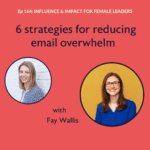Does just looking at your inbox create a rush of overwhelm? You’re not alone in that, the average person receives 121 work emails every single day!
In this episode, my guest, career and executive coach Fay Wallis shares 6 practical strategies you can use to reduce your email overwhelm. We discuss:
- Why grouping emails by sender is insightful
- The problems with using your email inbox as a to-do list and what to do instead
- When to hit unsubscribe
- How to ‘unsubscribe’ from internal emails
- Using tools like email templates and schedule send
- Prioritising deep work
- Setting email boundaries
I also share an excerpt from my current favourite book, Four Thousand Weeks by Oliver Burkeman on why inbox zero isn’t actually going to bring us the peace of mind we think it will.
This is the Influence & Impact podcast for women leaders, helping you confidently navigate the ups and downs of leadership and feel less alone on your journey as a leader.
My name’s Carla Miller, I’ve been coaching leaders for the past 15 years and I’m your leadership bestie. I’m here to remind you of the value to bring to your organisation, to help believe in yourself and to share practical tools and insights from myself and my brilliant guests that will help you succeed in your career.
You might also enjoy…
- Episode 120 Developing your career with Fay Wallis
- Episode 144 Finding focus when you’re overwhelmed with Julia Wolfendale
And we mentioned Graham Allcott’s book, How to be a Productivity Ninja and his email Rev up for the Week
Women Leading:
Come and join over 40 women in Women Leading – my community to help you lead without overwhelm. It offers peer support calls, group coaching calls, regular menopause events and a live leadership and wellbeing workshop each month on topics including…
- Managing an Overwhelmed Team
- How and When to Coach Your Team
- Reducing Drama in your Team
- Giving Feedback Without Feeling Awkward
Find up more and sign up here.
About Fay Wallis:
Fay is a career and executive coach, with a background in HR who specialises in coaching HR & People professionals. She is the Founder of Bright Sky Career Coaching and has a 5 star rated podcast called HR Coffee Time, where you can hear free career advice and ideas every week.
